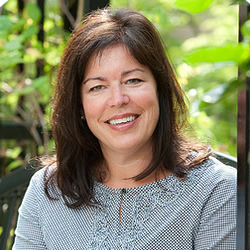When Support Falls Short
Things you can do and things you can say when you need more from friends and family

Photo by Edda Pacifico
Communicating with friends, family and loved ones is hard enough when you aren’t sick, but add a cancer diagnosis to the mix and oftentimes people simply don’t know what to say.
We sat down with Donna Murphy, co-director of the PsychOncology Program at the U-M Rogel Cancer Center, to talk about the issues cancer patients face when friends and family fall short in providing the support you need to face your illness.
Q. Why is it so hard for people to be there when someone they love has cancer?
I don't think it’s human nature for people to turn away. However, many people show support in ways that aren’t face to face or in words. Some of this comes from fear of being a bother, saying the wrong thing or making someone cry. Or, they might be better at housecleaning, weeding or picking up kids from activities. These are all acts of caring and support.
Examining the expectations you have of others is a good thing. That way, you can state your needs or wishes and have help getting them met.
Q. What are some of the difficult issues facing friends and families of a person with cancer?
Your friends and loved ones are scared and worried about the cancer, too. Hearing the news of someone they care about having cancer can be devastating. Maybe they don't know how to help or what to say so they do nothing at all. To the person who's ill, it’s the sound of silence. But to think they don't care could be the wrong assumption.
It's not uncommon to be uncertain and bewildered with how to face a cancer diagnosis for patients and loved ones alike.
Q. How can a person with cancer communicate his or her needs to loved ones?

- Listen first. Try to understand the needs of the patient and how you might be helpful right now.
- Let the patient know you are there and offer specific ways you can help.
- Don’t feel the need to talk about cancer. Most people just want to talk about life where you last left off.
- Listen for cues and ask questions to give the patient a chance to open up and talk about what he or she chooses.
One of the first things a patient can do is pay attention to who IS there to support you instead of focusing on who is not offering you support. A spouse or friend may be rallying and always at your side, but it won't be helpful if you are paying attention to the one person who hasn't shown up. Focus on those supporting you in the here and now.
Consider assigning a friend or family member as spokesperson to communicate your needs, such as prayers, meal plans or chores around the house. This person can help identify specific ways other people can support you. Your best friend might not know what to say or do, but now your spokesperson has told her what you need. Many people are great at behind-the-scenes task work. This is the perfect place for those "not good with words" to show their love and support.
Q. What qualities make up a good spokesperson?
In this day and age, it's often someone tech savvy who can get the word out via email or social media like Facebook. Look for a trusted person who is good with words and will share just the right amount of information based on your wishes.
Your spokesperson can post messages and photos and might take a little time daily for updates about your needs.
Q. Where can patients turn for more support if they need it?
I ask patients where they turned for support before they had cancer. Perhaps you participated in a running club or volunteered at your child's school. Someone in the group will almost always answer the call for help. Find the circle you existed in before you ever heard your doctor say the word cancer.
Within the Rogel Cancer Center, social workers, complementary therapists and spiritual care staff work with patients with concerns, fears and needs. They can identify community resources just for you. Some agencies have assigned volunteers to help people who are sick. Almost all hospices have great resources. There are support groups.
There are many places you can go for information, like the local library.
It's extremely important for a cancer patient to identify the need for help and ask for it, even if it's simply telling someone on your treatment team that you feel isolated.
Q. How can I help my friends, family and loved ones know what to say about my cancer?
There are many things you can do to help them, such as:
- Don’t be afraid to tell people what they can do to help, especially if they ask.
- Be specific about what you need and what you do or do not want.
- Give yourself permission to talk or not talk about certain things when others call or visit.
- Refer people to your spokesperson or website if you don't feel like telling the whole story over and over.
Read the Summer, 2013 issue of Thrive.
Continue learning about how to communicate with your family and friends about cancer
How to Be a Friend to Someone With Cancer [from the American Cancer Society]
Telling Others About Your Cancer Diagnosis
